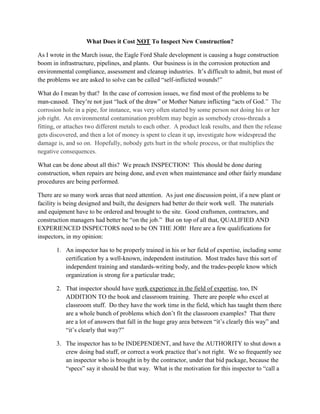The document discusses the importance and benefits of inspection during construction projects. It argues that many problems that occur later, such as corrosion or environmental contamination, are often due to issues that could have been caught during inspection. While inspection adds costs upfront, it saves money in the long run by preventing more expensive accidents and cleanup costs down the road. The document advocates for inspectors to be properly trained, experienced, independent, and have the authority to stop work if issues are found in order to maximize the benefits of inspection.


